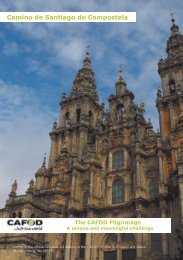Religious Education Curriculum Directory (3-19) - The Catholic ...
Religious Education Curriculum Directory (3-19) - The Catholic ...
Religious Education Curriculum Directory (3-19) - The Catholic ...
- No tags were found...
Create successful ePaper yourself
Turn your PDF publications into a flip-book with our unique Google optimized e-Paper software.
<strong>Catholic</strong> Bishops’ Conference of England and Wales — Department of <strong>Catholic</strong> <strong>Education</strong> and Formation4.2. Freedom, Responsibility and ConsciencePupils are introduced to the concept that freedom is the basis of human acts; the power to performand take responsibility for actions. Our moral conscience is the law of God by which we judge ourparticular choices. This is a life-long task in which we are assisted by the gifts of the Holy Spirit,supported by the witness or advice of others and guided by the teaching of the Church. Evil cannever be condoned even if good may result from it. Some actions can never be good. Our human actionsare rarely separated from human feelings. <strong>The</strong>se are neither good nor evil in themselves butbecome morally good when they contribute to a good action, evil when the opposite is the case.4.2.1. Freedom & Responsibility (1731-1742)A God created the human person a rational being,and therefore like God; he is created with free willand is master over his acts (1730)a Definition of Freedom (1731)b Perfection of Freedom (1731)c Free choice, blame and merit (1732)d Doing good makes us more free (1733)e Factors affecting Freedom (1735)B Responsibility (1736-1738)C Human Freedom in the Economy of Salvationa Freedom and sin (1739)b Threats to freedom (1740)c Liberation and salvation (1741)d Freedom and grace (1742)4.2.2. Conscience (1770-1794)A Definition of conscience (1777-1782)a Types of conscience (1785, 1790-1794)b Proper formation of conscience (1783-1785)c Moral responsibility of following an informedconscience (1783-1785)d Freedom of conscience (1782)4.2.3. Morality of human action (1749-1770)A God rules the universe with wisdom and directs itsdivine fulfilment (17<strong>19</strong>)a Eternal law (<strong>19</strong>50-<strong>19</strong>51)b Divine Providence (<strong>19</strong>75)B Natural moral lawa Reason participating in eternal law (<strong>19</strong>54-<strong>19</strong>55)b Basis for human rights and duties (<strong>19</strong>56)c Found in all cultures, basis for moral rules andcivil law (<strong>19</strong>58-<strong>19</strong>60)4.3. Law, Grace, SinOur pupils come to know God’s law by reason and revelation: <strong>The</strong> Law of the Old Covenant, throughthe Ten Commandments; the Law of the Gospel, expressed particularly in the Sermon on the Mountand the New Commandment of Jesus. With the help of God we can fulfil the responsibilities of thislaw and so find happiness. Grace is the free gift of God, the life of Father, Son and Holy Spirit in eachof us by which we are made holy. <strong>The</strong> gifts of the Holy Spirit enable us to share in the mission of theChurch, though the graces of the sacraments. Human and theological virtues develop and shape usas human beings. <strong>The</strong>re are no limits to God’s grace, mercy and forgiveness. Sin is always the resultof free will and the genuine failure of love for God, neighbour and ourselves. Mortal sin separatesus from God until we confess and repent.4.3.1. <strong>The</strong> Old Law (<strong>19</strong>61-<strong>19</strong>64)A Revelation.B Teachings revealed by God under the OldCovenanta Context of the Ten Commandments (2052-2074)b Principle of interpretation (2083)43
















